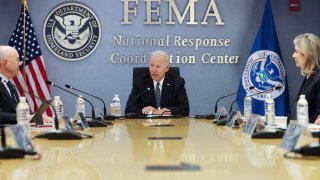
- President Joe Biden announces that FEMA will double the funding available to help cities and states prepare for extreme weather disasters.
- The total funds available through BRIC grants will rise to $1 billion this year, up from $500 million in 2020.
- Biden also announces the launch of a new NASA initiative to more closely track how the climate is changing.
WASHINGTON — President Joe Biden on Monday announced that the Federal Emergency Management Agency (FEMA) would double the funding available to help cities and states prepare for extreme weather disasters, to $1 billion this year from $500 million in 2020.
Biden also announced the launch of a new NASA initiative to more closely track how the climate is changing, and the impact of these changes on local communities, both in the near term and farther into the future.
The president revealed the additional funding during a visit to FEMA headquarters, where he received a briefing on the upcoming Atlantic hurricane season and delivered remarks to agency employees.
"Now is the time to get ready for the busiest time of the year for disasters in America," Biden said following the briefing. "Hurricane season in the South and East, and the fire season out West."
"We all know that the storms are coming, and we're going to be prepared," he added. "We have to be ready."
The United States endured last year 22 separate weather and climate-related disasters that each caused more than $1 billion in damages, according to a White House fact sheet. Taken together, the damages from these 22 disasters — primarily wildfires, hurricanes and snowstorms — amounted to nearly $100 billion.
Money Report
The newly announced funds will be distributed through FEMA's Building Resilient Infrastructure and Communities (BRIC) program. Created in 2018, BRIC awards grants to states, local communities and tribes to undertake pre-disaster hazard mitigation projects.
Monday's actions are the latest in a series of initiatives launched by the Biden administration to help measure and prepare for extreme weather events, which have increased in both frequency and severity as the climate has warmed over the past few decades.
Get a weekly recap of the latest San Francisco Bay Area housing news. Sign up for NBC Bay Area’s Housing Deconstructed newsletter.
Last week, Biden signed an executive order directing federal agencies to conduct a broad assessment of the financial risks posed by climate change to both government and the private sector
The order gives Biden's top economic and climate advisors four months to produce an estimate of how much it would cost to achieve a U.S. economy with net-zero greenhouse gas emissions by 2050.
From the start of his presidency, Biden has made tackling climate change an integral part of his governing strategy.
A centerpiece of his climate strategy, a clean electricity standard, is part of the $2.3 trillion infrastructure package currently being negotiated by the White House and Senate Republicans.
The standard would require fossil fuel-burning power plants to gradually adopt carbon free methods of generating power, like wind and solar. Under the standard as currently written, the deadline for making electricity carbon free would be 2035.






